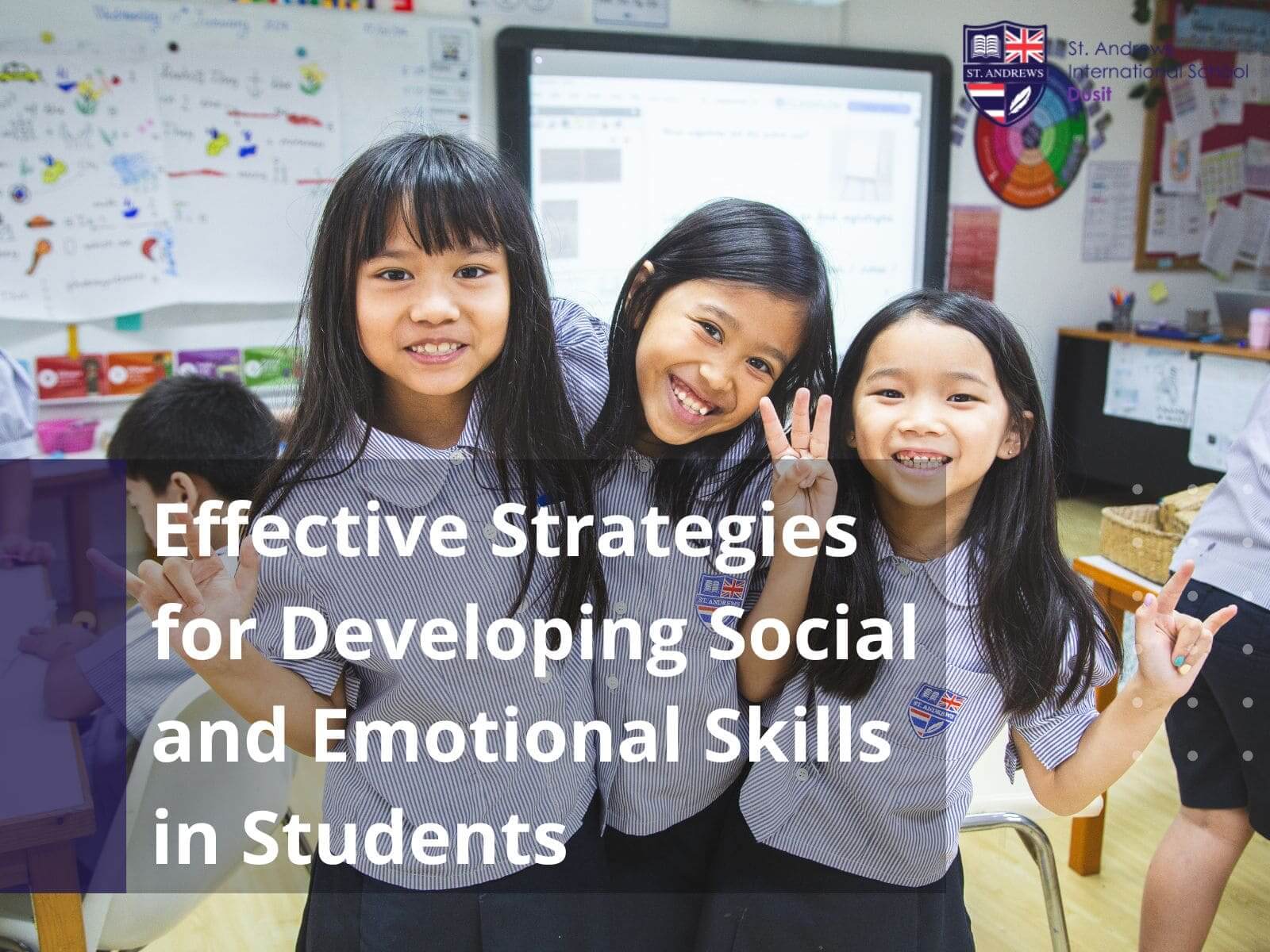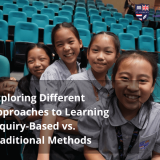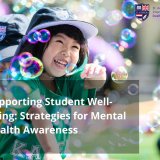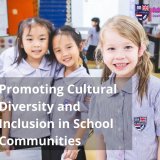Here at St. Andrews International School Dusit, we take it as our responsibility to mould young learners into successful career persons who will positively contribute to society.
We strive to achieve this through our holistic learning system that covers academics, extracurricular activities, co-curricular programmes, and even playtime.
We wish to instil into the young minds entrusted to our care a sense of advanced social and emotional development that will imbue them with self-confidence in social situations and resilience when it comes to facing inevitable life challenges.
The kids of St. Andrews Dusit will not be just satisfied with doing the bare minimum. They have enough emotional maturity to realise the benefits of patience, hard work, and goal-oriented decision-making.
Why Should You Develop Children’s Social and Emotional Skills?
Young persons require socio-emotional skills to find success or balance at home, school, and the rest of their existence as they grow from children to adults.
Using St. Andrews Dusit’s holistic system to promote social and emotional development as well as self-motivated academic improvement results in our school’s end goal of achieving a multi-faceted and holistically developed adult.
“Children that have highly developed socio-emotional maturity tend to be more optimistic about attending school, show more interest in learning, and tend to be happier overall.” (Teacher Quote)
Such skills help build the self-esteem and confidence of these young thinkers. It also makes them more mature enough to understand their strengths and weaknesses.
Never mind their intelligence quotient (I.Q). What about your children’s emotional quotient (E.Q.)? There are many reports of the Millennial Generation and Gen Z having issues with “adulting” due to over-dependence on helicopter parents. By attending a holistic learning institution like St. Andrews that values their social and emotional development, they would develop their E.Q. more and, thus, be better prepared in dealing with adult life.
It’s imperative that the child learns how to navigate through social situations whether they’re introverted (introverts) or extraverted (extroverts). Their time in the St. Andrews International School will help them develop strong relationships with their classmates and teachers for sure.
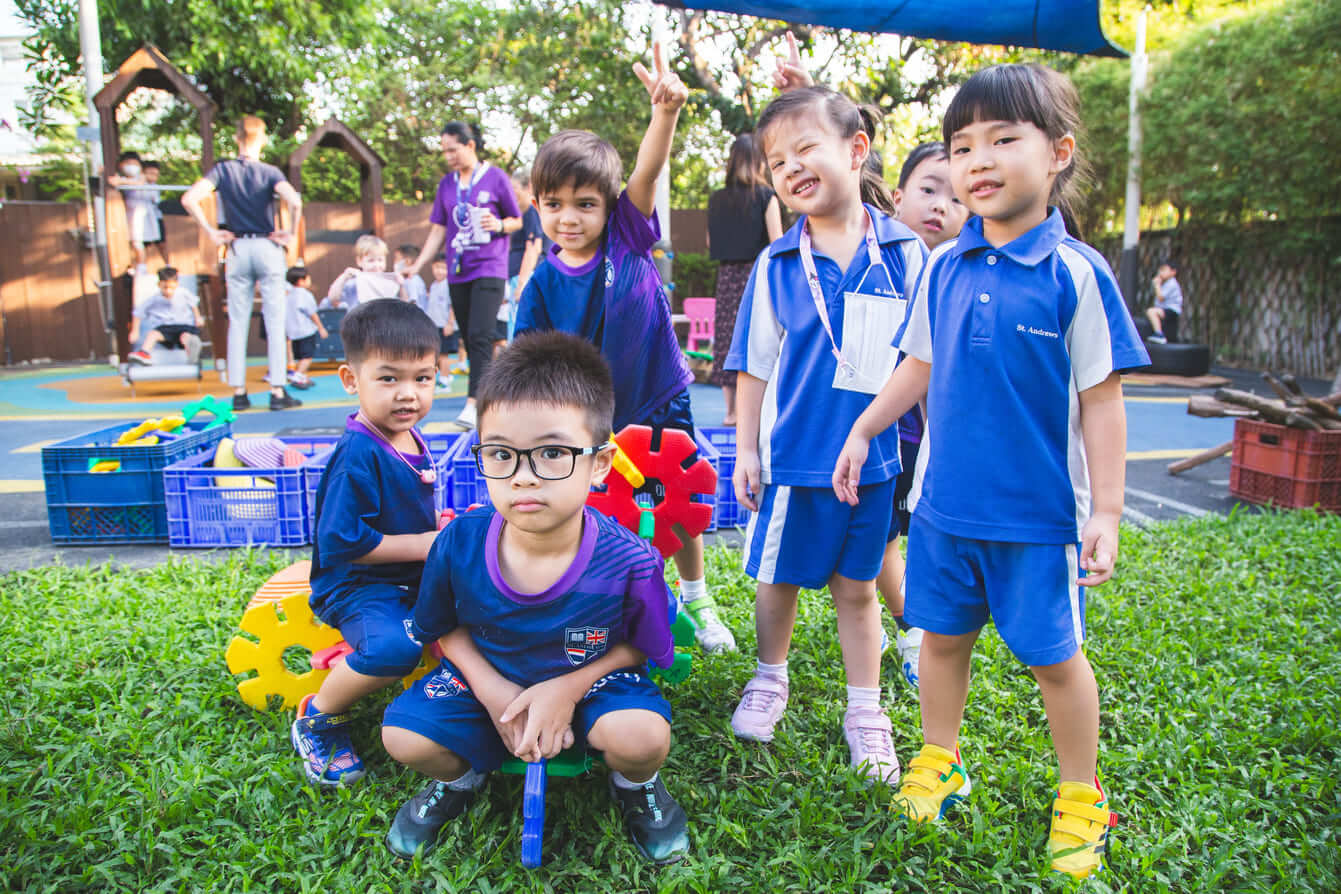
The Importance of Social Collaboration in Human Society
Society is built on the shoulders of giants and the collaboration of humanity as a whole. We value moulding your child into a social being and a contributing member of society while also having emotional maturity.
We regularly teach these young minds how to collaborate with one another through partnered and team activities. The school campus is host to a multitude of social situations as well.
The Roman Empire collapsed when the trust of the electorate was lost. To build the societies of tomorrow, you need loyal and well-adjusted citizens to help with the progress of the nations of the world.
The strength of a civilisation lies on its people. Even though advances root from the excellence of a chosen few, its spread wholly depends on a society filled with mature and engaged citizens moving together towards progress.
Whether your child is a born leader or a loyal follower, they should develop critical skills like understanding social cues and living in harmony with their neighbours.
We Make Time for Social and Emotional Learning
In many schools, social and emotional learning are put on the backburner over academic skills involving science, maths, history, reading, and writing. This is not the case for St. Andrews Dusit, and its children aged 2 to 11.
We practise holistic learning that deals with every aspect of the child’s maturity, so that as they progress on their academics and literacy, they also develop their emotional wellbeing and socialisation skills.
You don’t want your children to become socially awkward shut-ins with zero friends while being wholly reliant on you, the parents, to survive, right?
We will help your child develop critical skills such as:
- Reading social cues
- Making better decisions
- Improving listening skills
- Collaboration with others
- Navigating social situations
- The development of strong relationships
The development of the child’s emotional intelligence or E.Q. happens through St. Andrews Dusit socio-emotional learning activities. These activities help practise the kids’ mental and emotional skills, making them better equipped with the challenges of life.
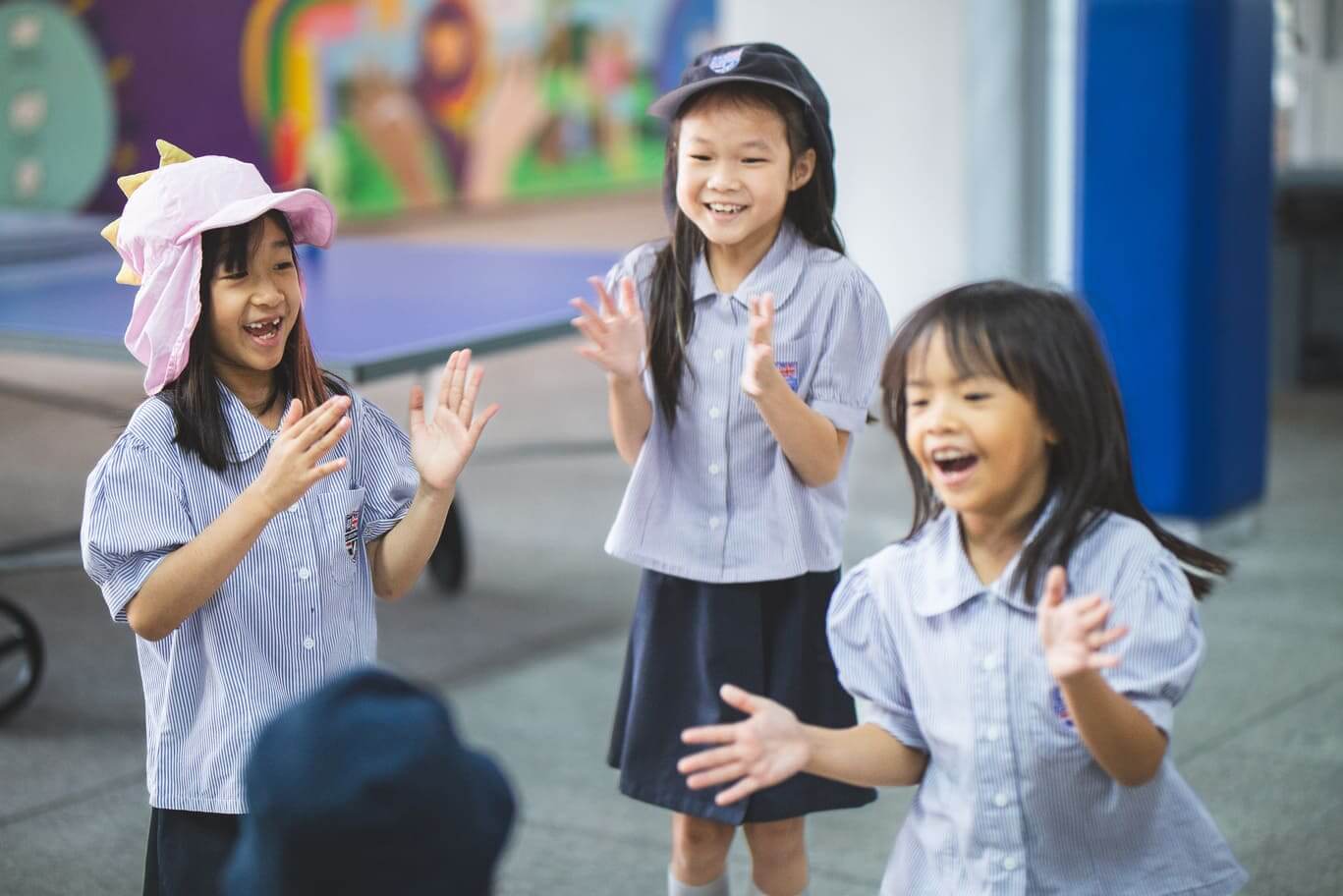
Using Journal Writing to Teach Socio-Emotional Learning
One way to develop the socio-emotional skills of young children from Nursery to Year 6 is to have them write in a daily journal. It helps them think about their actions more instead of going about their time in a reactive manner.
Writing things down can make children more pensive and considerate. They can then apply their ruminations to everyday life as formulated by processing their experiences.
For example, the teacher can ask the children, “When did you last use self-control? What was the result?” and the children can write about instances of patience and self-control. After such activities, we will also have the young minds share their responses with the whole class.
Public speaking is tough on people of any age, but once you get the hang of it, social interaction becomes much easier because you now have a closer bond with your audience.
We have our kids practising writing, group discussion, and partner work for the sake of socio-emotional learning every year at St. Andrews Dusit.
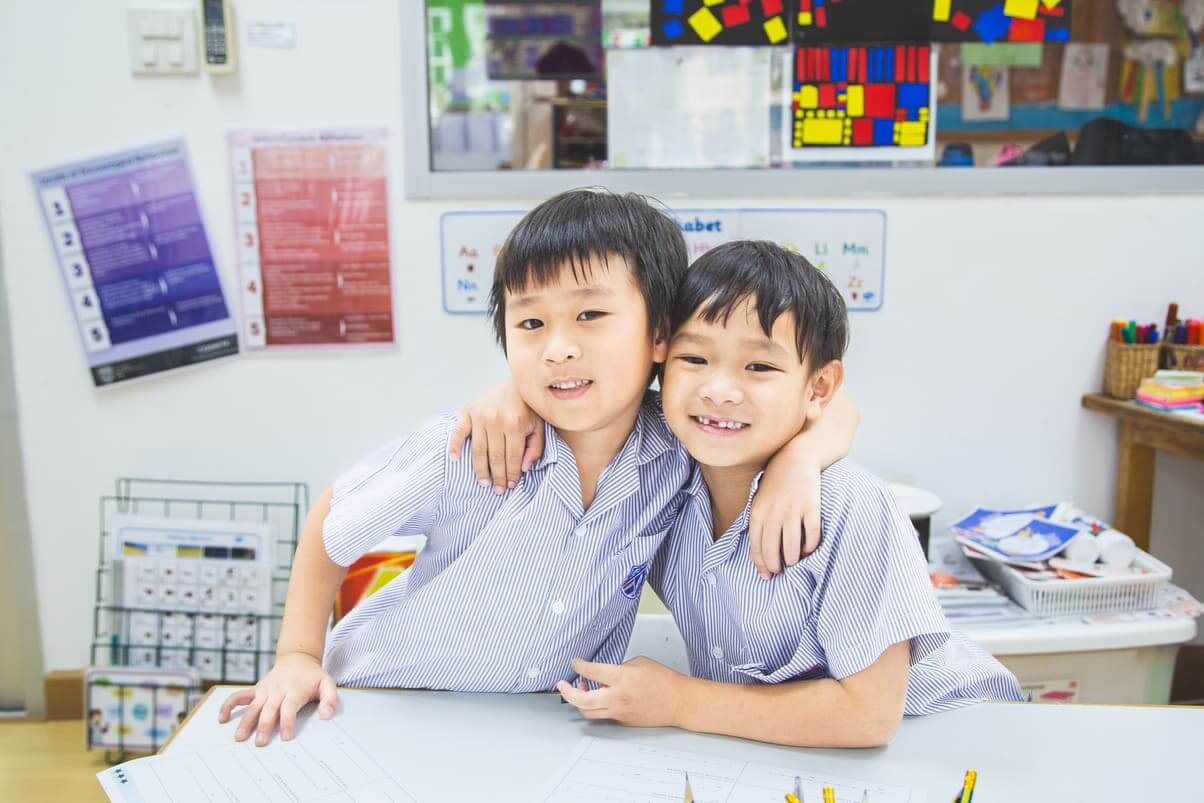
Doing Read-Aloud Activities to Improve Public Speaking
Few things bolster a kid’s ability to socialise and interact with each other quite like public speaking and group discussion. It helps them learn how to break the ice and get out of their shell, even if it’s an activity as simple as a read-aloud exercise.
Something as simple as an engaging oral recitation should help develop the socio-emotional instincts of very young children and it’s part of what most educators do already.
Hearty discussions of the subject matter are in order to teach these young minds the joys of communication and interaction with one another. It’s particularly helpful in opening their mind to different perspectives.
We encourage them to freely and confidently share their thoughts to the entire class so that they can learn how to express themselves better verbally. We also actively acknowledge them and their contributions to the class in order to make them feel “seen” and appreciated rather than ignored.
It’s an effective confidence boost for young ones to receive feedback on what they’re sharing, both from their teachers and their peers. This helps in developing their socio-emotional skills even further as they gain self-confidence to make themselves heard in a variety of social situations.
Summary
We at St. Andrews Dusit are dedicated to helping young learners achieve success in current and future endeavours by making them realise their full capabilities. We do this through a holistic learning system that supports not only their academic progress but also promotes the development of their social and emotional skills.
St. Andrews International Primary School Dusit is a proud member of the Cognita School Group. Cognita is a highly respected global institution that operates multiple schools in the Americas, Asia, and Europe.
Schedule a personalised school tour for St. Andrews Dusit to find out more about whether the holistic approach to education is the best fit for your child’s education. You will be able to ask any questions you may have, see the classrooms and facilities, and get to know the instructors and staff during the tour.

